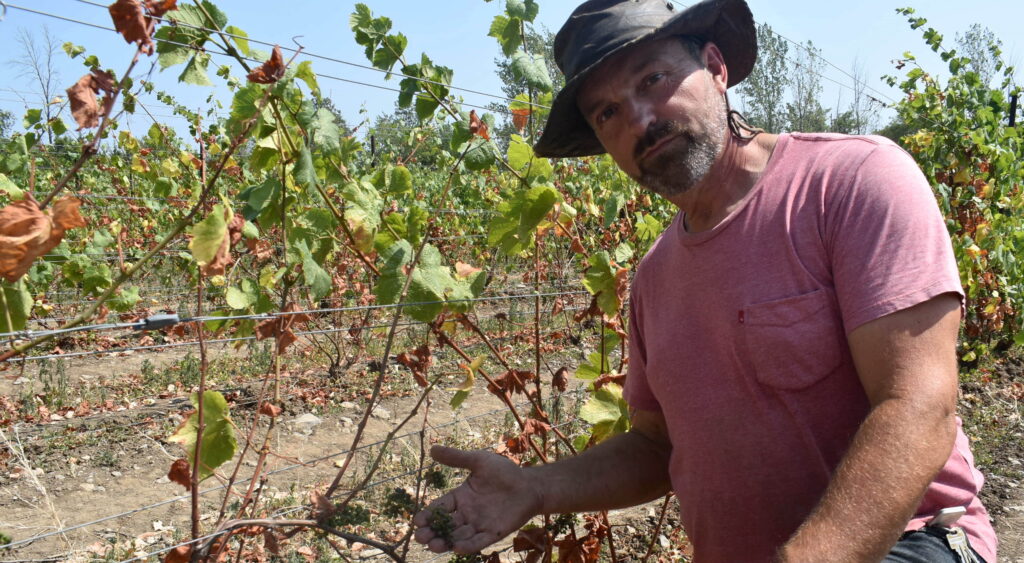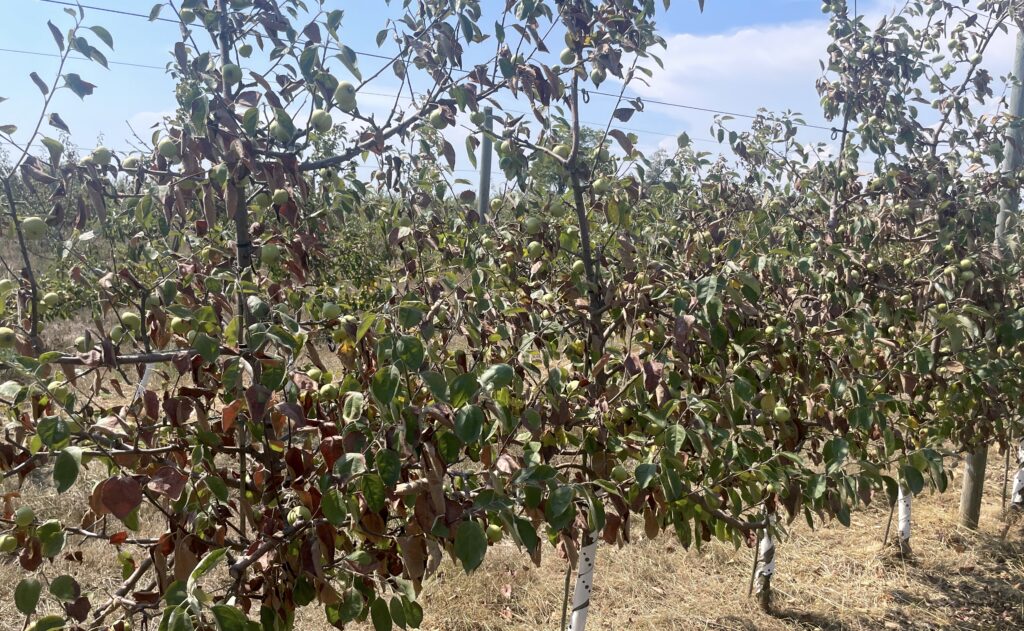 Workers at Broken Stone are watering 12,000 vines daily to keep foliage healthy and producing fruit. (Jason Parks/Gazette Staff)
Workers at Broken Stone are watering 12,000 vines daily to keep foliage healthy and producing fruit. (Jason Parks/Gazette Staff)
While farmers got a brief respite from continuing drought conditions last week — as much as 25 millimetres of rain fell on the parched earth in the early morning of August 13 — it wasn’t enough.
Certainly not enough for Tim Kuepfer and the staff at Broken Stone Winery in Hillier to stop having to haul water from the bulk water pump in Wellington for a day. Broken Stone and other wineries on Hiller’s viticultural miracle mile are battling hourly to fend off epic drought conditions in 2025. Meanwhile, the cideries like Loch Mor on Danforth Road, can only wait and see what Mother Nature releases from the sky. It’s the toughest of summers for anyone growing anything here.
It’s not often you see farmers out hydrating their vines. Grapes thrive in dry conditions. They mean more sugar, tougher skins, more flavour. Of the County’s commercial crops, grapes are the most drought resistant. Vines that have been growing at least five seasons have roots that can run deep into the subsoil. Unless they are on large sheets of limestone bedrock, they can find pockets of moisture to sustain themselves in dry conditions.
These are beneficial in a couple of ways: first, a drier year produces fruit with greater sugar content. A wet year causes water retention in the fruit, diluting the flavours.

Years with high moisture also lead to mould issues. In the previous two growing seasons, local wine growers were using spray to combat mould and some even employed fans to circulate air flow in problem areas of the vineyards.
Wineries on Hiller’s viticultural miracle mile battle hourly amid epic drought conditions.
Likewise, cideries can only wait and see what Mother Nature releases from the sky.
It’s the toughest of summers for anyone growing anything here.
Flash forward to 2025 and Mr. Kuepfer says there’s not much disease or fungus pressure, but “right now we are seeing a lot of wilt and stressed vines to the point that leaves are falling off. No leaves means no sugar accumulation —and no ripe grapes,” he said.
Broken Stone irrigates their 12,000 vines with about 10 litres per vine per day in a labour-intensive process that involves a vineyard tractor pulling a tote with a person slowly watering the base of the vines with a hose. Tedious to say the least.
The main concern for grape growers in the western reaches of the County is that surface water is nonexistent during a drought. Even if Broken Stone set up irrigation systems, there’s nowhere to pump water from.
As part of the Prince Edward County Winegrowers Association, Mr. Kuepfer said he recently asked the board to create a climate-change irrigation committee to lobby upper branches of government for drought relief infrastructure.
“If climate change continues and these types of droughts become more frequent, growing grapes here will no longer be sustainable,” he said.
Loch Mor’s Sara Boyd and her husband Gary have built up one of eastern Ontario’s most authentic artisanal cideries, featuring European and early American apples.

Over the last decade, Kingston Blacks, Harrisons, Harry Masters Jerseys and other select varieties have made Loch Mor an award-winning brand.
But a passing glance at the orchard reveals the trees are suffering. Badly. Ms. Boyd points to a stand of withered Dabinett trees not looking long for this world. Dabinett apples come from a soggy, coastal area of Britain.
“Looking at them now, I don’t know whether my Dabinetts are going to survive.”
The apples on most of the trees at Loch Mor are tiny. The trees stop providing nutrients to the fruit in order to save energy and protect themselves. Some are dropping leaves and their pea sized fruit in a effort to live on another year.
And it’s not just this growing season the Boyds are concerned about.
Even if there is an easy winter and a perfect spring, it takes half a year for trees to reset themselves.
That means the 2026 harvest will be affected as well. Mr. Kuepfer confirmed the same of his grape vines: damage from the 2025 drought will likely show up in the sugar and tannin levels of the 2026 harvest, too.
As for the apples, Loch Mor’s legacy varieties grow at premium levels during a regular season.
“Our flavours are already quite good. We have a high sugar content, we get decent tannins, so a dry year doesn’t help the product at all. And the volume just isn’t going to be there if we don’t get more rain in a hurry,” says Ms. Boyd.
But not too fast. And, at a certain point, it would be better if it didn’t come at all.
“We had a pretty dry summer a few years ago and then heavy rains came in September. It caused the apples to crack open just before maturation. We lost a lot of the crop due to it rotting on the tree.”
Some rain would help at Loch Mor. A deluge of next month, though, would create more problems.
See it in the newspaper